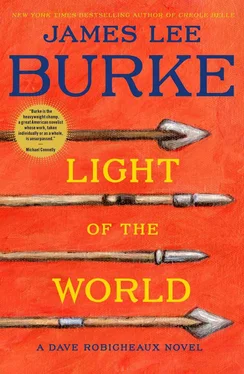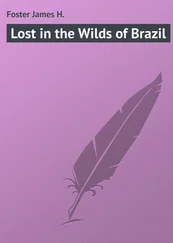Dixon was standing six inches from my face, his head tilted to one side; he seemed to take no heed of Clete. “You been bird-dogging me, Mr. Robicheaux? You still think I’m out to hurt your daughter?”
“That’s one reason I came out here. I think you got a bad rap on that.”
“I declare. I’m overwhelmed.”
“We have the same objective. We want to find the man who killed the Indian girl,” I said.
“Who says I’m trying to find anyone?”
“Gretchen Horowitz.”
“She was talking about me?”
“She said she thought you were a decent guy. Does that bother you?” I said, my control starting to slip.
“Nothing bothers me. Not when I’m in the spirit.”
“That brings up an interesting question,” Clete said. “If you’re giving witness in a language no one can understand, and you have no memory of what you said, what’s the point of giving witness?”
“Who says nobody understands it?” Dixon said.
“I got it. These guys are international linguists,” Clete replied.
This time Dixon looked directly at him. “Is that your Cadillac out yonder?”
“It was when I drove it here.”
“Nice ride. I hope the people driving the junkers next to it don’t skin it up. Maybe that’s the price of slumming.”
I saw the crow’s-feet at the corner of Clete’s eyes flatten, the color in his face change. “Maybe you and I should walk over in those trees and talk about it,” he said.
“Mr. Dixon?” I said, edging into his line of vision.
“What?” he replied, his eyes locked on Clete’s.
“Why is Felicity Louviere here?”
“Who?”
“Angel Deer Heart’s mother.”
“How the fuck should I know?” He turned his gaze on me. “Y’all don’t have no business here. This is our place. When we’re here, we do things our way. I don’t like people looking down their noses at my friends.”
“Clete grew up in the Irish Channel, Wyatt,” I said. “I got this white patch in my hair from malnutrition. When I started first grade, I couldn’t speak English. I respect you and your friends, and I think Clete does, too.”
“What you don’t seem to understand, Mr. Robicheaux, is I ain’t bothered y’all or put my nose in your business. I didn’t bother your daughter, and I didn’t bother them cops that drug me out to Albert Hollister’s place. But every time I turn around, one of y’all is in my face. It’s Sunday, and we’re fixing to have a community meal. All we want is to be left alone.”
Clete lit his cigarette and snapped the cap closed on his Zippo. “Why don’t you peddle your douche rinse somewhere else and let these poor bastards alone?” he said.
How’s that for diplomacy? I gave up and walked away. “Dave, where you going?” I heard Clete say.
I was so irritated with Clete that I kept walking toward the Caddy and didn’t turn around. I heard somebody walking fast behind me.
“Mr. Robicheaux,” said a woman’s voice.
She was a tank in her late forties, dressed in a frilly blouse and a suit with big buttons, her hair piled on her head, her face flushed and as round as a muskmelon. She had a notebook in one hand and a ballpoint in the other. For whatever reason, she seemed to be wearing amounts of perfume that could knock down a rhino. “Talk to me, please,” she said.
I tried to smile. “What can I help you with?”
“I’m doing an article on the Indians and the spread of fundamentalist religion. Also on the death of that young girl,” she said.
She told me her name was Bertha Phelps. She seemed agitated and breathless and out of her element. She started to write something on her notepad, then realized her pen was out of ink. “I hate these. Do you mind?” she said, looking at the Uni-ball in my shirt pocket.
“No, not at all,” I replied, handing it to her.
“Was that the mother of Angel Deer Heart I saw sitting in the back row?”
“That’s correct. How did you know my name?”
“I saw you in the grocery with Albert Hollister and asked someone who you were.”
Though that didn’t quite come together for me, I didn’t pursue it. “I’m in a bit of a hurry, Ms. Phelps. What’s up?”
“It’s terrible what happened to that young girl. I don’t understand why her mother is here listening to that man.”
“Wyatt Dixon?”
“A sheriff’s detective told me Dixon was the last person to see her alive.”
“I’d say he’s not a viable suspect.”
“Why wouldn’t he be?”
“I’m not qualified to comment, Ms. Phelps. It was nice meeting you.” I turned to go.
“It was just a question,” she said at my back.
The Caddy was locked. I looked back at the pavilion and saw Clete talking to Felicity Louviere. I also saw Wyatt Dixon carrying a paper plate stacked with fried chicken to a picnic table. One more try, I told myself.
I made my way through the crowd and, without being invited, sat down next to him. He never looked up from his food. “You weren’t truthful about your testimony,” I said.
“I’m done talking with you,” he said.
“You indicated you had no memory of it. That was a lie, wasn’t it?”
His forearms rested on the edge of the table, his hands empty and poised above his plate. He kept his eyes straight ahead, the late sun catching in them like reflected firelight. “I’d be careful what I said to the wrong man.”
“You’re an honest-to-God believer, Wyatt. You see things out there in the world that other people don’t. Does the name Asa Surrette mean anything to you?”
“Never heard of him.”
“You’re sure?”
“You got a hearing disorder?” he asked.
“The man who left that message in the cave was no ordinary man, was he?”
“You got it wrong.”
“Got what wrong?”
“It wasn’t no man that was up in that cave,” he said.
“Want to spell that out?”
“He’s goat-footed and has a stink on him that could make a skunk hide. Think I’m taking you on a snipe hunt? Ask Albert Hollister if he ain’t seen presences in that arroyo behind his place. Indians and such.”
“A goat-footed creature was in that cave?”
“There’s a hearing specialist in Missoula I can recommend,” he replied.
I decided it was time to get a lot of distance between me and Wyatt Dixon.
I tried to stay mad at Clete for provoking a situation with Dixon, but I couldn’t. Clete was Clete. He didn’t like religious fanatics and believed most of them were self-deceived or mean-spirited and did great harm in the world. I didn’t believe Wyatt Dixon fell into either of those categories. He may have been psychotic, or he may have been an uneducated man who’d found a form of redemption among the only friends he’d ever had, blue-collar people to whom the struggle of Christ was their own story. Regardless, Dixon had said something I couldn’t get out of my mind. He had mentioned Indian presences behind Albert Hollister’s house.
The arroyo that led from Albert’s gun range up the hillside to the logging road had been the route used by Chief Joseph and the Nez Perce after they outflanked the United States Army up on Lolo Pass and tried to escape relocation to Oklahoma Territory. Hundreds of them had filed down the arroyo in the dark, carrying their children and everything they owned on their backs. They followed Lolo Creek down to the Bitterroot River and then went south to the Big Hole, where they thought they would be safe. When the army attacked their village, the soldiers killed man, woman, and child, just as they had on the Washita and on the Marias and at Wounded Knee. It was genocide, no matter what others wanted to call it.
I asked Albert if he had ever seen anything unusual up the arroyo.
Читать дальше












